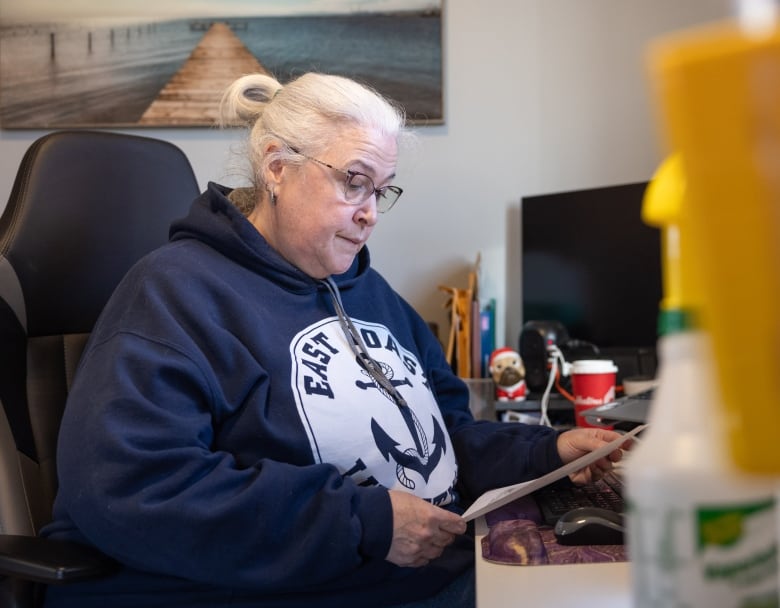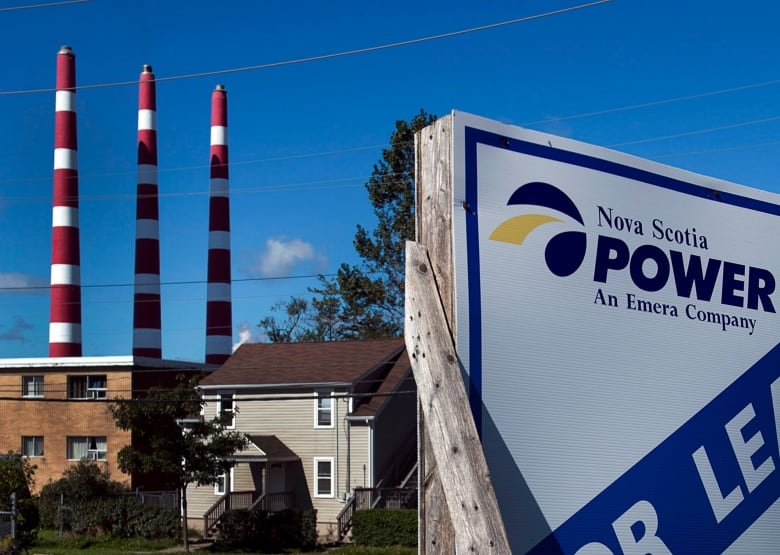
When Josh Feaver opened his most recent power bill, he felt both stumped and defeated.
The energy charges from Nova Scotia Power total $1,591.37 for the period spanning Dec. 13 to Feb. 14. That’s not including taxes or the additional $773.32 he still owes from his previous bill.
Feaver said he’s on the brink of being disconnected, which has left him looking for a second job.
“It will be a job for Nova Scotia Power and then a job to live,” he said.
The 26-year-old rents a two-bedroom apartment in Bridgewater, N.S., with his girlfriend, their dog, two cats and pet snake. Their unit is on the top floor of an older home with a heat pump. They moved in last April.
They plug in a space heater for about an hour on cold mornings, Feaver said, but he still doesn’t understand why his energy consumption spiked so high. They’ve unplugged the microwave and typically don’t turn on any lights until after 10 p.m., he added.
“Even last month to this month, the math doesn’t add up because my bill doubled.”
He said he called Nova Scotia Power three times and was told the problem is likely the heat pump. When he asked the utility to send someone to read his meter, he said they refused.
After CBC News contacted the utility about his situation, they contacted Feaver to investigate further.
Chris Lanteigne, director of customer care with Nova Scotia Power, said his team often works with tenants to examine previous power bills and help determine usage patterns.
More generally, Lanteigne said there were several days of “extreme cold” in January that likely influenced higher energy usage across the province.
A growing concern
Feaver isn’t the only one in disbelief over his latest power bill. More than 2,500 people have signed a petition calling on the provincial government to intervene after many of them also experienced rate shock.
A rate increase of 6.5 per cent came into effect on Jan. 1, but customers are questioning why their bills jumped much higher.
Danielle Fraser of Westville, N.S., said her energy costs tripled. According to her bill, she used 4,268 kilowatts in January compared to 1,832 kilowatts in November.
She said no one at the utility can tell her why she’s drawing more electricity when her habits haven’t changed. She runs three heat pumps in her home and said she has them cleaned regularly.

“They don’t know how the consumption is being used, they just seem to know that it is being used,” said Fraser.
She said she was surprised to learn the energy insights provided with her monthly online statement are only estimates.
“Those insights are actually not factual. They are what Nova Scotia Power assumed is using your power,” said Fraser.
Nova Scotia Power confirms the “appliance usage,” including heating consumption breakdowns, are approximate amounts intended to provide a guide for customers.
A legal assistant who works from home, Fraser has already taken her case through the dispute resolution process.
In his decision, the independent dispute resolution officer who handled the case said, “N.S. Power has appropriately billed the customer for on-premise energy consumption.”
Fraser plans to appeal to the Nova Scotia Utility and Review Board and have her meter analyzed by Measurement Canada, a federal agency that investigates complaints of inaccuracies. She has also complained to the office of her MLA, Premier Tim Houston.
“I would like the government to do an investigation and to see why the consumption is increasing so drastically for so many people. What are the billing practices that are causing this to happen so suddenly? It wasn’t a slight increase,” said Fraser.
Houston has been highly critical of both Nova Scotia Power and the Utility and Review Board. His government is in the process of moving ahead with a new independent energy system operator that would take some functions away from Nova Scotia Power.
An ‘energy poverty crisis’
Thomas Arnason McNeil, senior energy co-ordinator with the Ecology Action Centre, believes there is an “energy poverty crisis” that requires more attention from the government.
“People are really struggling right now,” Arnason McNeil. “They’re in a hole.”
Efficiency One is a non-profit organization based in Dartmouth that helps people reduce their energy consumption. Its December report estimated 43 per cent of households in Nova Scotia are experiencing energy poverty, defined as a household spending more than six per cent of its income on energy.
The numbers are much higher in Cape Breton, including Eskasoni with an estimated 87 per cent and New Waterford with 67 per cent.

Arnason McNeil said the situation is also dire on the south shore, where 102 households have electricity arrears totalling over $93,450, according to a community group there.
Feaver is one of those customers, and said he can no longer afford groceries. He makes $17 an hour as a cook at a local pub, so he nibbles at work.
But when he’s home, he said he often goes without food.
“I’m constantly not able to sleep, worrying about how I’m going to be able to make my next bill,” he said. “Getting a bill from Nova Scotia Power for $1,600 on top of car payments, rent and my phone bill and feeding the animals, it’s almost impossible.”
‘Blatant gouging’
The complaints don’t appear to be isolated to a few extreme cases, according to social media posts and the petition being circulated.
Rubin Coward has lived in his home in Lower Sackville, N.S., for 32 years and said he was floored by his latest power bill. He was charged $80 more than the previous billing period, even though he and his wife were out of the province for 10 days.
He said he turned his forced hot air furnace down to 62 degrees Fahrenheit (less than 17 C), shut the water off and unplugged every appliance.
Coward believes this is “blatant gouging.”
“When we see significant disparities like this in terms of billing and people are struggling, as it were, you know from the outset, I think it’s of paramount importance that we echo those sentiments in unison,” he said.
“We’re not complaining for the sake of hearing our voices, but we’re complaining because we want to be treated fairly.”
All three people interviewed by CBC have smart meters installed.
“From our perspective, the bills that we do issue are all generated from our Measurement Canada meters. We are confident in the bills that are issued,” said Lanteigne.
“Through the dispute resolution process the last few years since I’ve been with Nova Scotia Power, I am not aware of a meter that has been billing a customer wrong,” he said.
“We have a process in place where we encourage customers to call if they have concerns and talk to us with their bill. And if that is not to their satisfaction, the dispute resolution officer is the next path for them to help raise their concerns.”

